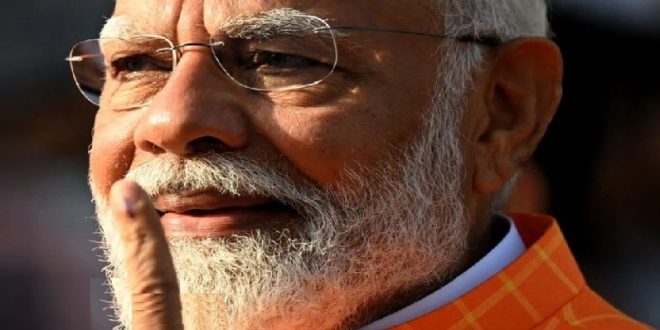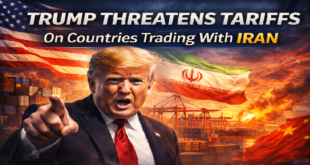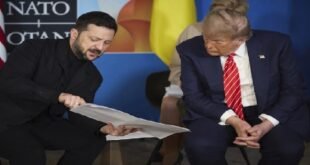12-05-2024
Bureau Report + Agencies
NEW DELHI: In the lead-up to India’s general election, Narendra Modi was expected to frame it as a referendum on his decade as prime minister.
He was expected to boast about achievements like generous welfare programs and spaceflights. He was to reaffirm that the new Ram temple in Ayodhya represented a cultural assertion for India’s majority Hindus. Even foreign policy was anticipated to influence the ballot, with the publicity boost afforded by Modi’s hosting of the 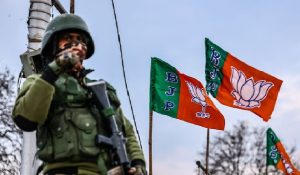 G20 summit last September. Opinion polls have predicted a third, record-equaling landslide win for his Bharatiya Janata Party (BJP) but early in the grueling six-week election, Modi’s campaign shifted gears, using divisive rhetoric that has raised questions about his tactics. He’s been accusing the opposition, led by the Congress party, of appeasing the Muslim minority community.
G20 summit last September. Opinion polls have predicted a third, record-equaling landslide win for his Bharatiya Janata Party (BJP) but early in the grueling six-week election, Modi’s campaign shifted gears, using divisive rhetoric that has raised questions about his tactics. He’s been accusing the opposition, led by the Congress party, of appeasing the Muslim minority community.
Muslims make up 14% of India’s more than 1.4 billion people. Taking a cue from Modi’s campaign, social media posts by the BJP have, according to the opposition, “demonized” Muslims.
He told a rally on 21 April that the opposition Congress wanted to distribute wealth to “infiltrators” and to “those who have many children”. His remarks were widely seen as referring to Muslims.
At another rally, he warned women that the opposition would confiscate their gold and redistribute it to Muslims. He accused the Congress of orchestrating a “vote jihad”, urging a “certain community” to unite against him. Modi even said the Congress would select the Indian cricket team “on the basis of religion”.
That’s not all. In a recent interview Modi said the “whole world” was trying to influence the elections. This week, Modi blamed the Congress for taking “truckloads” of money from billionaires Mukesh Ambani and Gautam Adani. Congress leader Rahul Gandhi has long spoken about the close ties that Modi shares with the country’s two richest men.
“For the first time you have spoken in public about Adani and Ambani. Is it your personal experience that you know they give money in trucks?” Gandhi responded in a video message. Neither businessman has reacted to the comments.
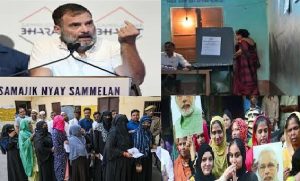 India’s opposition has also accused Modi of Islamophobia, calling his remarks “divisive, hate speech”. The Congress has demanded an investigation into a potential code of conduct violation. Since the BJP’s rise to power, hate speech against India’s 200 million Muslims has increased but Modi’s fiery rhetoric on the stump has surprised many, as they expected a focus on highlighting his achievements instead.
India’s opposition has also accused Modi of Islamophobia, calling his remarks “divisive, hate speech”. The Congress has demanded an investigation into a potential code of conduct violation. Since the BJP’s rise to power, hate speech against India’s 200 million Muslims has increased but Modi’s fiery rhetoric on the stump has surprised many, as they expected a focus on highlighting his achievements instead.
“To be honest, I thought Modi’s campaign would be much more about the rising India story, and about what they had done for the people,” says Rahul Verma of the Centre for Policy Research (CPR), a Delhi-based think tank.
Others say Modi’s remarks are not unprecedented. They point to many such instances during his previous election campaigns, including what they call his “inflammatory rhetoric” after the riots in Gujarat in 2002 ahead of the state’s assembly elections. “So, it has not surprised me, but is has shocked me. We often refer to such rhetoric as dog-whistling but there was nothing subtle about the language being employed,” says Milan Vaishnav of Carnegie Endowment for International Peace in Washington.
For one, many say, the BJP might have been spooked by a significant dip in turnout in early rounds of voting amid what has been a rather low energy election. In the previous two elections, won decisively by the BJP, high turnouts benefitted the party 2014 was largely a vote against the Congress, and 2019 was a vote for Modi.
 Pressmediaofindia
Pressmediaofindia
